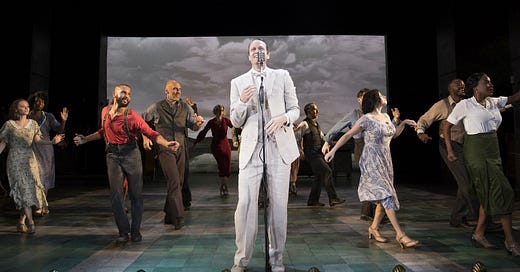When Bob Dylan followed his artistic pursuit, the audiences weren’t yet privy to his musical genius. It’s been documented enough that “booing” is part of the Dylan lore. The Broadway production of Girl From the North Country, written and directed by Conor McPherson, has a different problem. As scattered audience chuckles met offensive stereotypes and trauma, I wondered if any of us really understood what was going on. Or if the production itself did.
The show doesn’t really have a narrative, more evoking a time period and a feeling. In Minnesota on the cusp of the Great Depression, townspeople face personal misfortunes. They occasionally break into a Bob Dylan ballad. I hoped the re-imagined songs in this context would’ve illuminated new meanings to Dylan’s rich lyricism. But honestly, trying to figure out McPherson’s tone and meanings was a deeper challenge than I’ve ever faced with Dylan. And I’ve gotten in debates over “Tight Connection to My Heart.”
The characters are all troubled, and the only lightheardedness is offensively delivered. Elizabeth, a main character, is a woman with dementia who’s quips elicit frequent laughs from the audience. I get it, she’s speaking “truth,” when others cannot. But it felt very strange to laugh at her suffering and struggles with socializing. It felt lazy and othering; McPherson’s just invoking the trope of disabled people as wise pariahs. Early on, an old man character is in her home, and Elizabeth is clearly distressed by it. Elizabeth recalls when he assaulted her when she was very young. Between her role in the show as comedic relief, and the actor’s cartoonish “old man” performance, this moment was met with laughs. Even if the audience was misreading the tone, it’s the script and direction that’s cluing them to react that way. It’s offensive tropes all the way down. It’s no surprise that both her and the other disabled character, Elias, don’t make it out of the play alive. Their existence is a prison in this society, only granted freedom through death. Yikes! Elias is an adult man who they keep referring to as having “the mind of a child.” The actor’s portrayal of disability is fine, but his role in the story can only be compared to Lennie from Of Mice and Men. In one scene, his emotional distress manifests in physical violence against his father. When his father kills him, he comes out in an all white suit, free from the constraints of his disabled body. Able to articulate for the first time, he performs the only energetic number in the show, “Duquesne Whistle,” a manic, gospel-like performance. Not only does it imply that Elias was “saved” by death, but that there was a “normal,” aka neurotypical soul inside him all along.
These disabled characters and their roles represent a larger problem with the show. Conor McPherson tries to marry a full play with existing music that doesn’t necessarily apply to it. This is true of many jukebox musicals, but it’s especially apparent with Dylan’s songs, which are stories all on their own. In order to make it work, McPherson requires the character to be completely divorced from the plot to start singing. Whenever a character steps into a song, they are usually intoxicated, in a dream, or otherwise out of their mind. In effect, McPherson is saying that you have to be crazy to say the truth of the matter. Considering this seems to be the only message the show has to say, it’s not much. Especially when Dylan, who wrote that truth, is a real person. He’s a real, white man, who presumably has no other qualifiers except exceptional talent and nerve. It’s odd to me that the play makes this point that’s undermined in real life.
It’s somehow weirder when the songs are applied in context. When a Black drifter explains he used to be a boxer and just got out of prison, it’s difficult not to chuckle. What a setup. If they included “True Love Tends to Forget,” did we need to shoehorn in “Hurricane”? Nevertheless, it was a beautiful and rousing performance of the song. Curiously, they didn’t include the n-word lyric, which I thought was a smart move, until the same character later says it in the script. Another white writer reinforcing Dylan’s mistake.
Racism, disability, sexism all take place in this world, but without much commentary. The young writer/lover gets aggressively racist when he’s drunk, but it’s never addressed again. Does it matter whether our titular Girl runs away with the boxer or stays with the old creep? What’s it saying about the characters? What’s it saying about society? When the narrative doesn’t start or end anywhere, it’s difficult to find the meaning. Everything can be attributed to set dressing. It’s America in the 30s, I guess. Depressing!




Thanks so much for this review. My wife and I felt gross watching this play (I wouldn't call it a musical), and we had a hard time articulating why. We agree with your assessment.
Just watched this show. Depressing show based on a depressing period in America. Excellent songs, generally well sung with new arrangements. The dialogue, however, is shallow and scattered. Multiple characters, multiple themes, but none developed beyond the superficial.